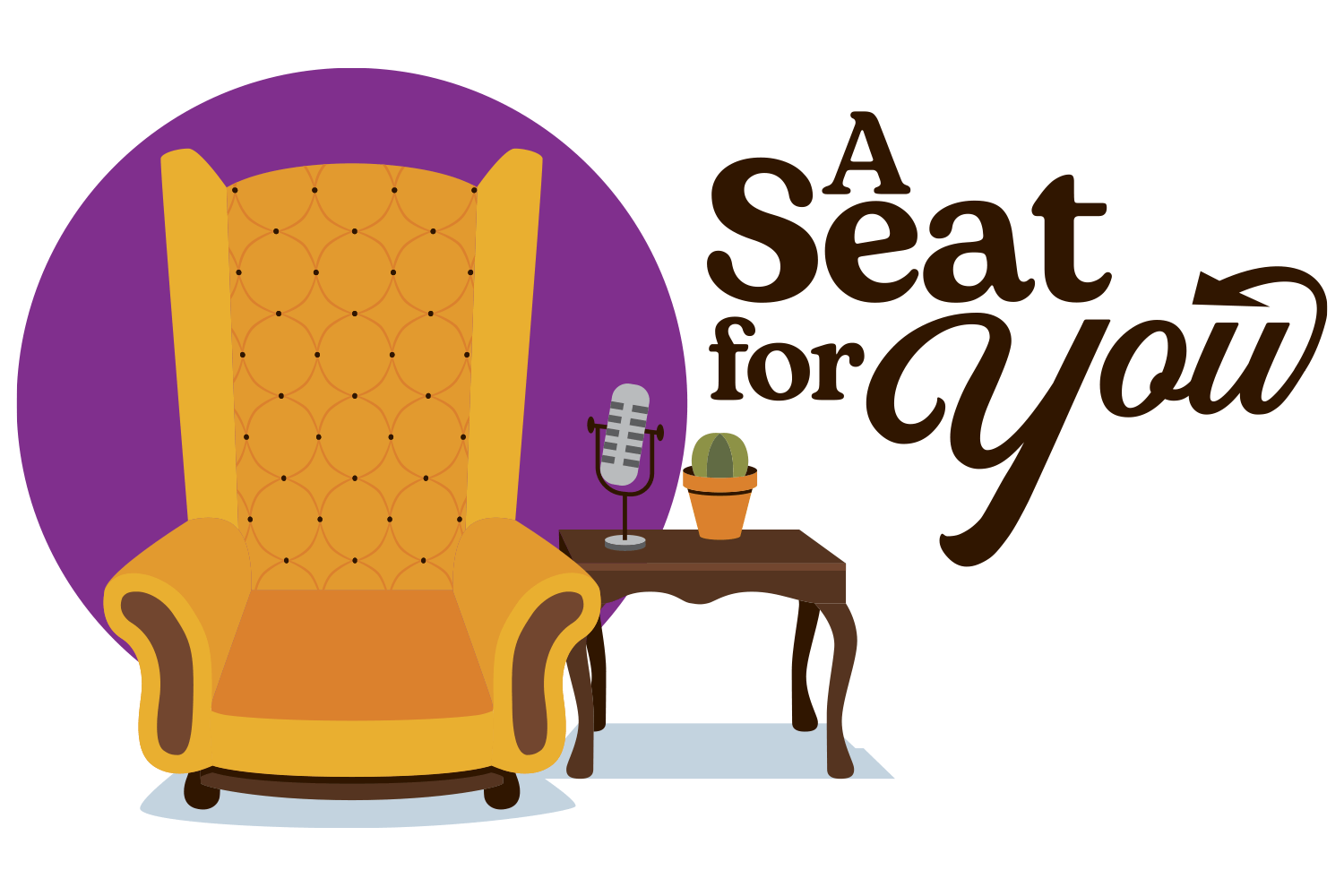Episode 6- What Are People's Biggest Fears?
Episode 6
April: [00:00:00] Hi, and welcome to another episode of a Seat for You. In our last episode, we talked about how we reset or recharge when things get overwhelming in life, and then we asked you to share some ways that you all like to reset. And so we have a few that we'd like to share with you before we dive into our next topic.
Leslie: All right, so today we're delving deep into one of the most powerful emotions that shape our lives fear. In this episode, we are going to share with you a few of our personal fears that have been weighing on our minds. Some are rational and some irrational, and then we're gonna help each other come up with some practical ways to overcome these fears.
We expect you may share in some of these or have others of your own, but hopefully we can encourage you to tackle them with us. So let's dive in. All right, so April, um, Fears. That's a very big topic. , and a [00:01:00] scary topic for many people.
April: Well, I think I wanted to talk about it because it just seems like there's just so much of it everywhere, and it made me kind of think of like, what's, what are, what, what am I afraid of?
Like, what are my true fears in life? And I don't know, just wanted to talk about. That. 'cause I know that other people probably have maybe some of the same.
Leslie: Yeah. I mean, 'cause I think fear just, , it runs so deep in everything. It, runs in, faith and politics , and just your, everyday like livelihood.
April: And everybody just, there's just this air of like, people just seem so unhinged lately and it's like, what are, what is everybody just so afraid of? Yeah. You know, like the, just everything. I don't know.
Leslie: Yeah. All right. So should we do rock, paper, scissors to see who's gonna [00:02:00] start? Or do you just wanna start?
April: You wanna do like one in one? Sure. And then go to the next one? Yeah. All right. You go first. Me? Yeah. All right. So I had to think hard about this, but not at the same time because I really wanted to , be true to really what I feel on to my core. Um, because everybody's got those fears and a lot of times I think we just shove 'em to the back burner and don't really think about 'em or talk about 'em.
And so when it's time to bring them up, it, you really have to like dig in there and find them, even though they're with you every single day. But for me, my, my biggest fear is rejection. And I'm sure a lot of people have that fear or maybe they don't give a crap if what people think. But, um, I was kind of raised to think, to, to care about what people think.
And so rejection is a big one for me. [00:03:00] Um, I'm, you know, the fear of being rejected by family, by friends, for having like different beliefs. Yeah, that's a, that's a, that one runs deep for me because I've been in that echo chamber for so long. If I share that, I actually believe this about this, that's like, it can cause a chain reaction and it's, it moves faster than the prayer circle.
So I guess that fear of what may come back to me,
Leslie: well, We, we had mentioned. In, uh, in past episodes about if people change and it like, or realize there's cracks in the foundation, the whole foundation falls or Right, you know, the structure around you fall and, and we talked about how, you know, with our parents, if they start.
If they break out of that bubble that they might potentially be in [00:04:00] that they, you know, might lose all their friends or lose their way of life, or, you know, just in the big picture type of thing. So is that what you fear? Do you fear the same thing that they ultimately might fear by change?
April: Yeah. Yeah. And I think another thing that kind of goes hand in hand with the rejection is disappointment.
And I mean, honestly, it's probably right up there with that rejection. Like just the fear of disappointing people, of disappointing someone, , who has like expectations of me. Mm-hmm. You know, like you're a fear of disappointing your parents or, , Your friends or someone that you've looked up to, you know, fear of disappointment.
'cause that's like, that's paralyzing, you know? And it will cause you to sit still and not move [00:05:00] because you'd rather not have them be disappointed. 'cause disappointment really kind of equals rejection in your mind, and you'd rather just suffer through whatever than. To feel that, 'cause it's like the worst feeling.
So
Leslie: is this, at least for me, is this in the column of, um, irrational or an irrational fear for you? Um, why'd you have to go
April: there? Um, I think it's both, honestly, because it's irrational to think that I'd be like, you know, alone. Even if certain people do kind of be like, Hmm, I can't really align with that. I can't be your friend, whatever, whatever that even looks like.
'cause saying it out loud sounds really stupid now, but, um, I know that no [00:06:00] matter what, that doesn't mean that I'm alone. Right. I'll always have surroundings and I'll always surround myself with people who love me and support me no matter if they. Believe the same things or not, right? So in a sense, it's an irrational fear that a rejection would cause me to crumble.
'cause I know that that wouldn't happen.
Leslie: So if we're supposed to also kind of think through and talk through advice on how to face these, You know, it's human nature that we're all really good at giving other people advice, but not really good about taking it, taking it ourselves, or giving ourselves the same great advice that we give other people, right?
Mm-hmm. So if you had a, a friend or a family member that was going through whatever the situation is that you have going in your mind, and you are gonna offer them [00:07:00] advice, What kind of advice would you give them?
April: Well, I know that keeping secrets is like really hard for, it's really hard on your body, really, truly. So I would want them to be free of that no matter who rejected them. And even if it's like, if it's family, that really does suck. But. At the end of the day, at least you know where you stand and you can move on and heal from that rather than live with the debilitating fear overcoming your body.
'cause that's, that's stress that's not good for you, you know? So that's probably what I would tell somebody.
Leslie: So why is that advice that's so hard for you to take for yourself?
April: Because it's, 'cause it's [00:08:00] me. 'cause it's my own. Like I, it's 'cause I'm the one having to do the work in there. It's work that I've got to do.
And I mean, I guess I'm that kind of person that will put something off and put something off when it comes to confrontation and then there comes a time when. I'm done with it and I can't take it any longer no matter what it is. And then I am, I'm done with it, and I'm gonna deal with it right then. And then it's done.
So a lot of times it just takes me being like completely to my wit's end before it happens, before I'll actually do it. Mm-hmm. And that's not healthy either, right? 'cause that means that happens in like, Relationships with something that bothers me. I'll just kind of let it go [00:09:00] and let it go and let it go and let it go.
And then suddenly it became too much and then it all comes out and then the other person's like, what just happened? Mm-hmm. So it's like I'm patient, but then until I'm not so. And I can, I will get that way with myself as well. So when I know something needs to be done and I'm acknowledging that it needs to be done, I'll get there.
I just need to work on getting there quicker. Right. And actually just, just facing it rather than, than putting it off and anticipating or waiting for the perfect time or, you know, so this is a fear that, you know, you
Leslie: can overcome. It's more, it almost sounds like it's more worry. You're worried about the outcomes?
April: Well, what's the difference in fear versus worry in this?
Leslie: I don't [00:10:00] know. Is there a difference? I don't know. Worry seems like it's something that's continually nagging at you. I would think a fear would be, , you're just scared of. The end result, like the worry is the con, like the worrying is knowing that you're gonna have to get to that fear one.
Mm-hmm. One day. 'cause the fear is the end result. Right. But a lot of times we worry and we build up these things in our mind and make it worse, and we make it worse, and we come up with scenarios that never even happened. Right. I mean, we're our own worst enemies when it comes to things like that. Right.
I mean, my, one of my fears is, is extremely similar. I mean, it is, it is a form of rejection. Um, which, you know, I'm an Enneagram too. So that is, that generally is what I am constantly [00:11:00] combating. Is anyone rejecting me like I want to be loved. Period or accepted or whatever. But I think it's a little bit different.
, like for me right now, it would be the rejection of like not ever even being given a chance. You know, like someone just rejecting you based on how your appearance or what they've heard about you from somebody else, or their assumptions about you like that would be. A situation that would be fearful.
'cause it's, it could, it could happen at any point in time. It's, it's one of those things that, it's not that I worry about it every single day because I don't, you know, I mean, you, for me, like I genuinely. Don't pay attention to most people around me when I'm going through, you know, life and not in a bad way, but just, I, I just don't pay [00:12:00] attention to anything like that.
But it would be more about if that day came mm-hmm. And someone immediately like I met, just didn't wanna have anything to do with me, just off of a glance, you know? Right. And as it as who I am, I'd be like, Well, that sucks. Or, yeah. That's sad. Yeah. But sometimes I also have to look at that as, is that the universe protecting me from something?
April: Right. Is that someone you'd want to have anything to do with anyway?
Leslie: Right. But, some of those people may be people that it's not like I like. I might not have a choice. Mm-hmm. You know, they might be people that I have to deal with. Right. Or they may hold part of your career in their hands. They could be professional people, they could be family, they could be, it could be a variety of situations.
It's not a, it's not like a stranger on a street Right. Kind of [00:13:00] scenario. But it's, it's like, you know, making, knowing that you may put other people in. Uncomfortable places just because of your mere existence. Right. You know, that is, I guess, a fear similar. Mm-hmm. But different, a little different than yours.
April: So what would be your next one, if that, is that your top one?
Leslie: Um, I mean, I don't really have them in any kind of order of weight. You know, like a one, two, or three. Um, , one thing that I've always am fearful or worried about , especially as I get older, is financial security. Mm-hmm. I mean, I'm gonna be, you know, reaching retirement at some point in time in the next.
Hopefully 15 to 20 years. And you always wonder like, are you gonna make good financial [00:14:00] choices? Are you gonna retire with enough money? Are you gonna be able to do the things that you wanna do? And with the way that the world is going right now, , , there's always just so much uncertainty in the air.
And, , being someone who is. An entrepreneur mainly, and then also has, you know, other streams of income or revenue. I mean, you kind of are self-reliant on that. Not that, I mean, I guess everyone's technically self-reliant on their employer 'cause they have to go to a job or whatever.
Whether it's them employing their selves or somebody else, I employing them. Right. But, um, you know, it's a different kind of pressure. Mm-hmm. When you're responsible. For yourself and others. Right. Um, and so that's like, it's, I think finances have, have always most of my life been something that [00:15:00] will keep you up at night sometimes, but it always works out.
So it, to me, I think this, if I had to put it in a column, You know, it would, it would be more like, it'd be like 70 30 in the irrational column because yes, everybody should plan for financial security as, you know, moving forward as you get older. Um, but you know, in my experience, it always seems to work out.
Right? So is it real or is it irrational? You know?
April: Yeah. I mean, it can, it can be both. I mean, That's one of, that's definitely on my list too. Um, just making enough money to even have something to put aside to retire because, um, up until this point I've made sacrifices in order to like be, I don't know, I'm getting emotional right now.
This [00:16:00] is stupid. Well, just.
I made sacrifices that allowed me to be present for my kids, and I've been like emotional in this and I don't even know why.
Leslie: I think it's probably because of the kids. I think you get emotional when, when it, the kids get pulled into it. You made that choice. It wasn't like it. It was a sad choice for you.
Right. But maybe the reason that the emotions are coming out is because maybe you feel like there was a part of you that didn't get to do something that you know, that part of you may have wanted to do.
April: Yeah. I mean, I don't know because I know that if I had gone for the career, That I would [00:17:00] look back on this time and be like, yeah, I have 25 years of a career under my belt, but what did I miss as a, you know what I mean?
There's no way I'd trade that. Right. And I feel completely lucky, blessed, honored, whatever to have been able to do that. It's coming to a point where they're getting, you know, older and I, I will have a different income. And so now it's where I'm feeling like, okay, not that I'm not mom still, but now I'm gonna have to like kind of start over in some kind of career.
Leslie: Like a new identity.
April: Yeah. Or like, you know, I'm having to start from scratch kind of somewhere, even though, I mean I'm doing, I'm doing this and I've done this and done this for a long time. But then I'm like, man, there's people my age that have been their careers for 25 years already, or 20 years, you know?
And it's like I'm starting [00:18:00] from scratch. Mm-hmm. Not starting from scratch, but, 'cause I have a lot of skills and I have a lot of experience under my belt, but it's like I'm having to build that career now, you know? Mm-hmm. So, I'm just now being able to start over a 4 0 1 k or a retirement account because, you know, in the past, because of, you know, circumstance, that's not been something I've been able to do.
Leslie: Well, that's definitely something that I'm sure many people listening to this can relate to. You know, we're the bulk of the people. You know, in this country, live paycheck to paycheck. Right. You know, and, and the idea of, of savings or retirement is just, you know Right. A farfetched thing. Yeah. But, you know, it sounds like maybe there's fear around what that new identity is [00:19:00] gonna look like after your kids get older and go off and have their own families.
April: Right. And I know that I'll adapt probably pretty quickly, but. I also like, I know, I remember what it's like to, to struggle
and have to choose between gas or groceries one week, and I don't wanna go there again. And not that I ever would, that's probably like an irrational fear, right? Because I mean, I make decent money, you know, like, but it's always that like in the back of your head, like, 'cause anything can happen to anybody.
You know, half the homeless people on the street, it happened so easily. Mm-hmm. You know? Mm-hmm. But anyway. What's your number? Two or three? Wherever, what number are we [00:20:00] on?
Leslie: Oh, I don't know. Are we supposed to help you get over that? Or you just wanna let that one?
April: Well, I'm just sharing with you the fear of, you know, not being able to make enough to retire comfortably or, you know, make ends meet or be able to help my kids if they need something later.
Right. Well, I think
Leslie: we dug into some things there that are a sensitive area, so maybe on future episodes we can dig in a little deeper there. Dive back into that. Yeah. Um, I would say
I have this like, you know, if, if you don't know us, we're based in Florida and it's pretty tough to live in Florida right now and, , You know, so well, depending who you are, it's tough. Yeah. I guess depending on who you are. But, , for me, I have this fear [00:21:00] of like, will I ever find a place to live that's a welcoming community that you don't have to.
, fear that when you walk down the street, you're gonna get looked at or someone might feel entitled enough to come up to you and confront you on something or
April: Right. Or one of these unhinged psychopaths, pull gun, you know? Right. 'cause that's, it sounds like a crazy fear, but it's actually not crazy anymore.
Leslie: Right. I mean, we live in a state now that you. It's constitutional carry. You don't even have to take a a, a class or get a permit to carry a gun around. And, um, you know, with as much hate and division and and such in this country, and you know, we were watching some video on Instagram where people were [00:22:00] getting angry at a basketball game, like they were getting kicked out of a basketball game because they're just so angry.
Yeah. There's just so much rage. In the air and, , , I don't even know if a place like that exists. Yeah. You know, whether, even if it, even if it's, , everybody you know is like, oh, I'll just leave this country. It's like, really? Because we're, we're outside of this country . , is a safe space.
And in a, I mean, I'm sure there's a few, but like, Could you even afford to live there? Like is there work for you are coming from America? Will they even give you the paperwork to allow you to accept them? Will they accept you into their borders? Like, yeah, I mean that's one of those things, it's like, do you just, um, alter your lifestyle, alter how you live wherever you're living.
That might be uncomfortable. Just try to live the best life that you can. 'cause that doesn't seem fair. Right. You know, or keep your nose [00:23:00] down. Yeah. I do think that is a rational fear. If anyone has suggestions on a quality place to live in this country that's affordable. Hit me up.
April: Yeah. Um, another one for me is, um, that my kids will be hurt for things that they believe because.
, my kids definitely, I mean, they're educated and they are well-informed of things and they have massive hearts and wanna be allies for anyone in a, an oppressed community. And they have lots of friends like that, and I don't want them to be targeted or hurt for being an ally. , like what we've seen this past week, someone just is an ally and they're killed just for being an ally and it, that's just ridiculous.
Or them [00:24:00] being, , victims of a shooting at their school because guns are just easy to get and school shootings are common. So I think that's probably a fear every parent has is their kids, you know, being part of a crime or getting hurt at school and them not being able to do anything about it or help or prevent that.
Um, so.
Leslie: So we've gotta offer some kind of solutions because this is gonna be a really depressing episode. ,
April: right. Well, and I, we can work backwards if you want. Like, so for that one, I know that all I can do is prepare them as best as possible. Mm-hmm. Um, all we can do is prepare our kids for, for what we know is out there and, um, Yeah, that's it.
And they, so they, I mean, they can prepare and they, and that they expect that people will not be kind. [00:25:00] And so, I don't know, you know?
Leslie: Yeah. I guess it's like be the kindness, right? It's hard mm-hmm. To have consistency with that. Right. Especially with, you just feel like every day you're, you get beat down with something else, but.
You know that, that's kind of the same thing with, you know, finding a place, a welcoming place to live, and what do you do until that happens? I mean, no, you can't, you make your own surroundings where you would like to live, right? , I guess it's one of those things that, you know, I, do believe that your life is planned out.
You, . We're kind of like in a play and the script's written, and I, I think there might be some things that you can do along the way and it might alter your, your, the direction of, you know, your path. But I think ultimately when it's your time to go, you're gonna go no matter, like you see that like with people that will [00:26:00] smoke.
A pack of cigarettes or two packs of cigarettes a day and live to like 110. Right. But then, you know, somebody that's 21 might die from lung cancer. Right. Who's never smoked, ever. Right. It's like, yeah. Those are those things that you just don't know. Right. So you can't, I guess just the advice I need to tell myself is you just have to go out there and do your thing.
Mm-hmm. And if somebody else is made uncomfortable by that, But that's really their problem. It's not your problem. Right. And if something comes of it, then you, it's my due diligence is to be prepared to mitigate anything that might come my way. Try to diffuse the situation, right. That might come my way.
April: And obviously, avoid situations that, you know, would put you in harm intentionally. Right? Like, you're not gonna go to like a, an anti. Uh, L G B T convention. Right, right.
Leslie: But sometimes you end up in those places like [00:27:00] unknowingly. Right? Like, like the other night when we were, were out here in, in Denver.
Mm-hmm. Um, at, at a conference and we went to a, a restaurant restaurant. And we were having a good old time at, you know, we were with a another colleague of, of mine and we were talking and, and just having a great meal and a great time and laughing and then all of a sudden we, we looked up and literally every table was all men.
And it was all like a certain kind of man. Right. You know, and, and I think there was like one or maybe two other women. Sitting at tables and there were women working there. Mm-hmm. And no, we weren't like at a strip club. I just wanna make sure Right. Preface that it wasn't a gentleman's club. It was, it was a normal restaurant.
Literally a steakhouse. It was a steakhouse. So, you know, but it was, it was the oddest experience I'd ever had. Like I look around and Right, and it was like no matter the [00:28:00] size of the table, it was full of men. Yeah. I don't know, you know, not to stereotype or judge, but. I even asked the waitress, are we in a safe space right now?
Like, and she was like, sometimes I wonder that myself. You know? So those are the situations where you just never know. I knew at that point in time when I, when I was, became aware of my surroundings, I was much more alert. Mm-hmm. I was, because prior to that, when we first got to the restaurant, We were just talking and then we were engaged in conversation and just really having a good time, you know, and that's where my attention was.
But as soon as I became aware that I was literally surrounded by, I don't know, 150 dudes, yeah, maybe it was like, no Women Wednesday, and we just didn't know. Maybe, I don't know. But, , I definitely wanted to get out of there as soon as, as quickly as, as, uh, we could. So, Anyway.
April: But yeah, being prepared.
Um, [00:29:00] as far as my kids are concerned, as long as they leave the house and I know that they're prepared for what comes their way, then I can mitigate irrational fears. Um, as far as like, you know, financially tackling that at,
Leslie: I think that's all about planning too. Mm-hmm. I mean, really a lot of these fears. Or any kind of fear can be, um, supported by a goal. Right. And, and, and I mean, if you just sit around and don't take any action to achieve anything, then you're, you will probably fail. Mm-hmm. Right. You will probably. Have to make tough choices.
April: This is saying you, you fail a hundred percent of the times that you don't try. Right. And so, you know, for you, you obviously are gonna have a career in front of you. It's scary [00:30:00] because that's not a role that you've really had to play in a long time. Right. You know, I think probably for you, and this is completely just my opinion, I think the sadness comes from.
The loss of that
Leslie: routine because you really enjoy that routine. Yeah. You enjoy, you know, going to the kids' soccer games or doing the things. Mm-hmm. And as the kids get older, I think. Most moms probably go through those feelings that you're going through. Although, although people like Jen Hatmaker that we follow mm-hmm.
You know, she's super happy. The kids got outta the house. Right. Um, yeah, because that's like, now it's her time. Now it's her time to get to like, live the way I, I wanna get, she wants to live to feeling that way. Well, we're gonna see her eventually, right? Mm-hmm. So maybe we can ask her. How to do, how to make that happen.
That could be the one question that we can, we can ask her. But I think for the financial stuff, and this is, you know, I'm [00:31:00] answering my own questions, it's, it's all about planning and making smart choices and, you know, study like one tip that I always heard was when you got your paycheck was to always pay yourself first.
And that was putting a specific amount of money into savings. And And you do that religiously. And yes, that comes from a very privileged stance because some people don't have enough to put in in savings. They don't have enough to put in savings, and they need to borrow or put on charge cards to even make it to the next paycheck.
Right? But if you do have the ability to even put a little bit into savings, then do that because there's also some people that will go shopping at Target. You know, and spend, you know, right. Like when they get their paycheck and all of a sudden they've blown, oh, I don't have any savings. Right. Two or $300 on frivolous things.
Right. And I'm, I can say that [00:32:00] because I also target, have, target is difficult. Done that, so I'm just as guilty of spending money on frivolous things. You know, I, I know I could be way, way better with my money. So maybe the fear really is that I know I'm not doing good enough. So like Right. I, I scare myself because I know I could be doing better.
Right. But you just like, you don't wanna, I don't wanna, because I like, I like having fun and I like doing things. And what if you die tomorrow? Right. Who cares about the money you have in savings? You know, like, right. Live today, but if I don't die tomorrow. Right. And if you live another 60 years, that then there's gonna be a problem.
Right. I will be living on the street, right, with my target purchases. All right. So we would love to know what irrational or rational fears you have. , send us, send us a [00:33:00] note, send us an audio file. , drop us a comment on our website and we can tackle them together. Yeah, we would love to, , work with you on something like that.
So, Until next time. See you.













